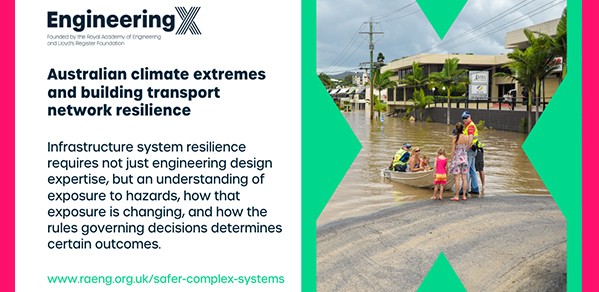
Dr Kristen MacAskill has been announced the project lead of the Engineering X-funded case study ‘Australian climate extremes and building transport network resilience’. Research Associate Dr Marlies Barendrecht is also taking a leading role and alumna Dr Catherine Tilley, based at King's College London, will support them in the project.
Our Australian case study considers the criticality of the transport service provided to communities: survivability is fundamentally linked to transport connections.
Dr Kristen MacAskill
The project is one of 19 awarded funding by Engineering X – an international collaboration, founded by the Royal Academy of Engineering and Lloyd’s Register Foundation, that brings together some of the world’s leading problem-solvers to address the great challenges of our age.
The case studies, drawn from around the world and from different sectors, are of vastly different complex systems and have been commissioned by the Safer Complex Systems mission within Engineering X, which has also published its first strategy outlining its approach to promoting better understanding of complex systems and how to manage them.
Dr MacAskill and her team will focus on disaster risk governance implications for transport infrastructure in Australia. The research will explore the process of flood recovery and how the socio-technical system surrounding transport infrastructure management has changed over time. Data collected from a review of legislation, design standards, government reviews, organisational reporting, academic literature and stakeholder interviews will inform practical insights derived from a decade of learning in Queensland.
The project aims to demonstrate Queensland’s development of risk governance over the past decade to allow others to readily learn. It will highlight perceived successes and failures in infrastructure investment rules that shape what and how infrastructure is rebuilt. The study will share lessons through capturing the complex response to major climate events and how this experience has shaped regional capability to prepare for and respond to disaster risk.
Dr MacAskill, Lecturer in Engineering, Environment and Sustainable Development, said: “Infrastructure system resilience requires not just engineering design expertise, but an understanding of exposure to hazards, how that exposure is changing, and how the rules governing decisions determines certain outcomes.
“Traditional transport safety focuses on how asset design and management can minimise frequency and severity of accidents. This case study adopts a wider perspective to consider the criticality of the service provided to communities: survivability is fundamentally linked to transport connections.
“It has already been a rewarding experience being a part of this programme – it is designed to promote sustained discussion across everyone involved, rather than just sending us off to do our own individual projects.”
Learning from others
Each of the case studies will examine the underlying principles of a success or failure story (past, present or potential) and will summarise this information as a set of generalised learnings from which the wider community can learn. They will help support much-needed collaboration and knowledge sharing among diverse sets of stakeholders who currently talk about complex systems in very different ways.
“Complex systems are many and varied, growing in number and impacting our lives daily, often in ways we don’t realise,” says Professor Roger Kemp MBE FREng, who leads the Engineering X Safer Complex Systems advisory group, explaining the background to the mission.
“The world’s climate is an important example of a complex system in which natural phenomena are interlinked and changes in one can impact others via complex feedback loops, many of which are not well understood. Essential services such as health and social care, education, food and water supply, communications, finance, retail, transport and power supplies are also more interconnected than ever before. When complex systems don’t work as expected or fail altogether the impacts can be far-reaching.
“Some complex systems are engineered – such as a city metro system – there is a plan, the participants are known in advance, and there are protocols and regulations in place. There is little ambiguity over its geographical extent, assets, operations or responsibility for the safety of the network. Other complex systems can be ad hoc – with no central authority, players joining and leaving at will, and regulation covered by multiple jurisdictions.
“Often people find themselves in a complex system-of-systems that, until one system fails and there is a cascading effect on lots of other systems, no-one had previously thought of as being interconnected, and the development of appropriate oversight and governance is not keeping up with the pace of change.”
Professor Brian Collins CB FREng, who chaired the case study selection panel, said: “It is clear that when it comes to the challenges of living and working safely in an ever more complex and unpredictable world and the systems within it, we need to develop new tools and more agile ways of approaching education, training, policymaking, governance and regulation.
“The Engineering X Safer Complex Systems mission is itself proving a study in complex adaptive learning and all the signs are that the case studies and the teams developing them will make a significant contribution to understanding whether it is possible to find common principles and new models for the management of safer complex systems. The lack of common experience and language at the interface between engineered and non-engineered systems is one area that we believe may be worth exploring in more detail, but it is dangerous to make assumptions and we need the help of a wide community of experts who have relevant experience and fresh insight to offer.”
View the full list of commissioned case studies.

